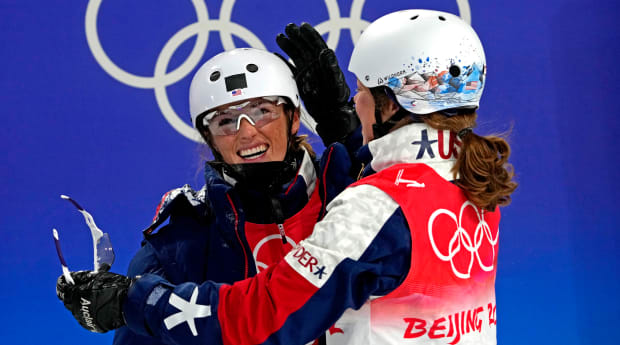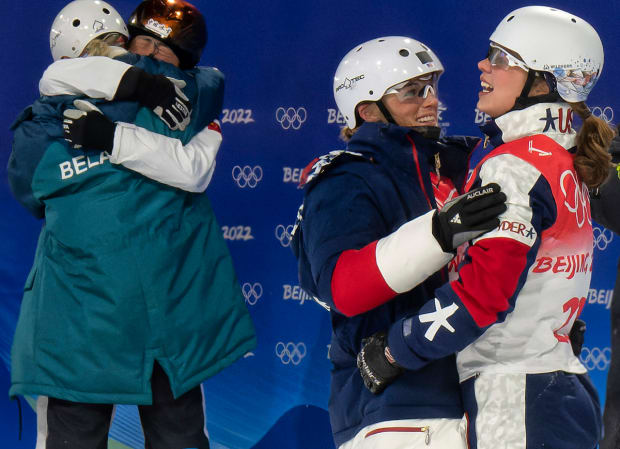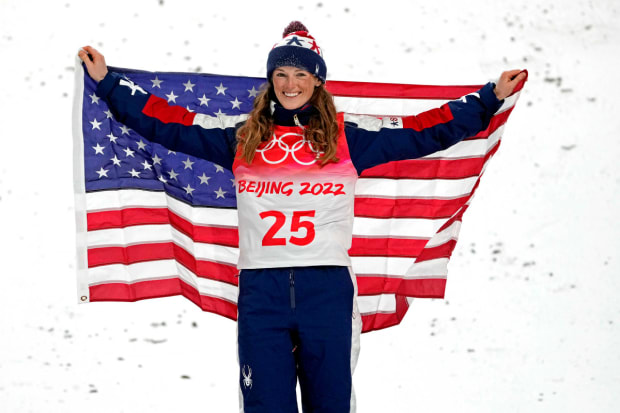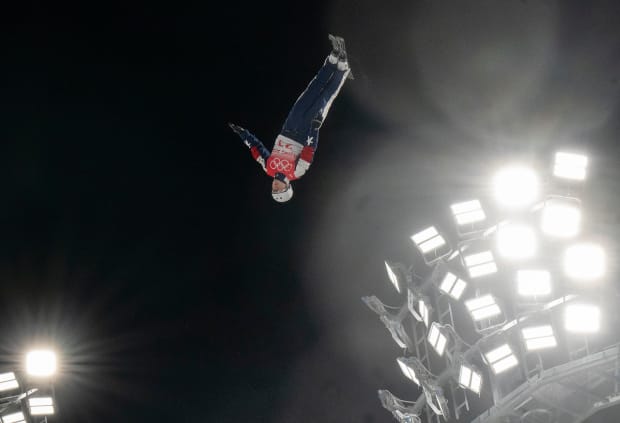ZHANGJIAKOU, China — On page 17 of the official playbook of the 2022 Winter Olympics, under a section bearing the bolded headline, MINIMISE PHYSICAL INTERACTION, attendees are strongly advised to avoid, among other things, hugging. But damned if some ink on paper was going to stop Ashley Caldwell from squeezing out every last drop of feeling Monday night.
For starters, it was minus-10 Fahrenheit at Genting Snow Park, the sort of crazy cold that turns eyelashes into icicles and fingers into freeze pops. Huddling for warmth only seemed like the right thing to do. But there was a deeper reason why the 28-year-old American went from foe to foe at the women’s aerial skiing finish line, wrapping each in a tight embrace even though a slight stumble on the landing of her last run had ensured that she wouldn’t join them on the podium.
“I respect all the athletes out there, but they also, I feel like, respect me,” the 28-year-old American said. “They know also how hard this is. And the hugs make it end, but it also makes you feel better.”

Jack Gruber/USA TODAY Sports
So she sought out U.S. teammate, Megan Nick, whose bronze medal marked their country’s first of any sort in the event since 1998. “Knowing that I was in third and she got knocked to fourth,” Nick said, “that was a bittersweet moment.” And she found Chinese gold medalist Xu Mengtao, whose winning back-full-full-full trick inspired local journalists to hug, site volunteers to cheer and even nearby taxis to honk their horns. “I’m so proud of TaoTao, and I’m so proud of Megan Nick and I’m so proud of [Belarusian silver medalist] Hanna Huskova,” Caldwell said.
“They’re incredible athletes, and there’s always heartbreak amongst great success.”

Erick W. Rasco/Sports Illustrated
Rarely, though, is the fine line between these two binary outcomes—heartbreak and great success—not only laid so bluntly bare but also so willingly brushed aside among competitors in the name of solidarity. But consider that both Caldwell, speaking in the mixed zone, and Nick, sitting in the medalists’ press conference, turned to the same word to describe the emotion that had hit them when it was all over: relief.
“The Olympics [are] incredibly stressful, and we put a lot of heart into what we do,” Caldwell said, later adding, “All of these athletes have been experiencing stress like never before. One way or the other, time is inevitable, and it’s over now. But the stress is over too.”
“I haven’t been able to hang out with my friends or family in two months,” Nick said. “But also just wanting to do your best here. It’s one event, and that doesn’t necessarily show all the training that I put in over the last eight years. And I think that weighed heavily on me most.”

Jack Gruber/USA TODAY Sports
As that weight begins to lift over the next days, weeks and months, both women will undoubtedly find it replaced by pride. Nick, a former gymnast who didn’t pick up the sport until she was 17 when she attended a tryout camp in Lake Placid, N.Y., for a school project, will go down as only Team USA’s second women’s aerial medalist ever. Caldwell, despite falling short for her fourth straight Olympics—dating back to a 10th-place finish in 2010 in Vancouver, where she was the youngest athlete on the entire American roster—will still head home with some shiny hardware, having won gold in the debut of mixed aerial skiing alongside boyfriend Justin Schoenefeld.
Then there is what this Valentine’s Day meant to those who have dedicated their lives to fearlessly soaring off steep ramps; spinning and flipping through the air like juggling pins; and loving every second of it. Six women advanced to the winner-take-all final round. The last four to go—Caldwell, Xu, Australia’s Laura Peel and China’s Kong Fanyu—attempted the once-vaunted back-triple-full, a backflip with three consecutive twists.

Erick W. Rasco/Sports Illustrated
“It’s just great to see women who are pushing the sport be successful as well,” Nick said, “because it inspires more people and more women to believe that they can do it as well. It’s really important to have so many girls on the triple tonight, as well as have someone who’s competing triples end up on top.”
Of course, someone else had to wind up on the bottom too. Peel— a two-time aerial world champion and one of two Australian flag-bearers in the opening ceremony at these Games—fought back tears in the mixed zone as she fielded a battery of questions from Aussie reporters about the disappointment she felt, including this absolute doozy: “Laura, you sound really hard on yourself. I mean, what do you do? If I used to lose a game of footie I’d go and, like, kick the can or something like that, or swear at my wife. What do you do?”
“I don’t know,” Peel said, searching for the right words but coming up empty. “We’ll see.”
Maybe a hug would help.







